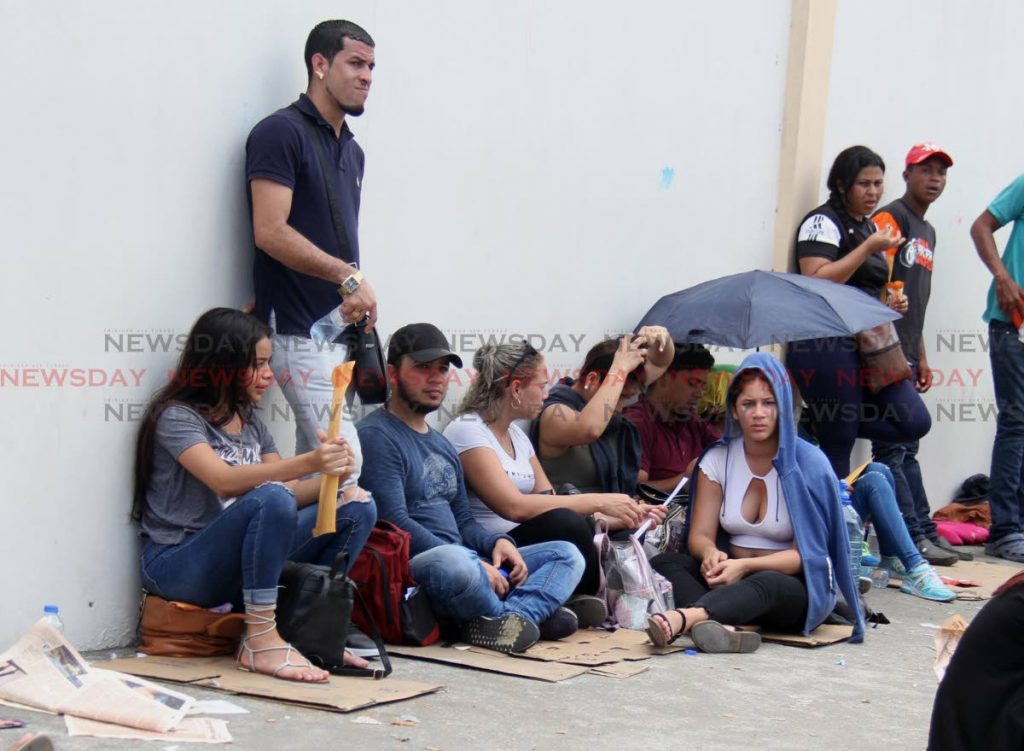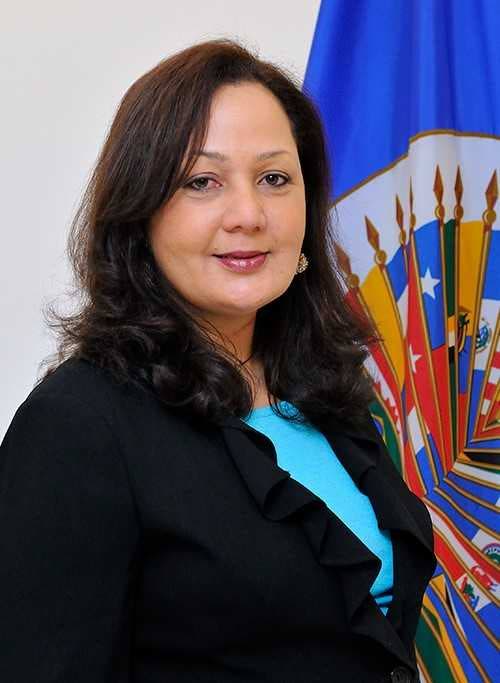Female migrant abuse alive

A special agency recently set up to avert the sexual exploitation of migrant females in TT has begun to receive positive feedback from women whose pursuit of a variety of professions has been affected by their decision to abandon their homeland to seek refugee status in other countries. Some of these women have begun working in TT but they say their pay is just not enough, and several agencies here are viewing their situation as one of exploitation.
Nalini Telemaque who only a few days ago launched Telemaque Brand Ambassadors to assist the migrant women says she has gotten responses so far from some 15 Venezuelan women who were studying in such fields as law, medicine and engineering in Venezuela. But they are among thousands of citizens from the mainland republic who have turned to TT in search of a life better than what exists in their politically and economically challenged country. Their new environment, however, is marked by exploitation, sexual and otherwise, as has been noted in the most recent US Department of State Trafficking in Persons Report published last month, and also by some local agencies who have been advocating on the women’s behalf.
"Migrants are not numbers. They, too, are human beings deserving the same respect and human rights that we so justly fight for, for ourselves,” said Dona Da Costa Martinez, executive director of the Family Planning Association of TT (FPATT).
At an Inter-American Commission of Human Rights (IACHR) hearing in May, Martinez said the association has documented that female migrants are vulnerable to sexual violence. She was among three speakers who voiced complaints of human rights violations against Venezuelan migrants in TT and expressed disappointment with the treatment these migrants, especially women, have been receiving.
The hearing was a collaboration between the IACHR and the TT International Human Rights Clinic, which is under the Faculty of Law at the University of the West Indies (UWI), St Augustine. The State was absent from the hearing, much to the disappointment of the speakers who said they expected their attendance due to the seriousness of the issue.

Dean of the faculty, Professor Rose-Marie Belle Antoine, said xenophobia and ethnic profiling are making Venezuelan women more vulnerable in TT.
She said, "We contend that gender is structurally related to race, nationality and discrimination whereby Venezuelan women are stereotyped. These gender intersections are particularly evident with regards to sexual violence and discrimination in an environment that offers little to no protection for Venezuelan migrant women. Women and girls who are indeed trafficked persons continue to be identified as prostitutes and illegal migrants as opposed to victims needing state assistance and support."
While she believes the Government's decision to have a two-week registration process for migrants from May 31-June 14, allowing migrants to legally reside and work in TT for one year, was a step forward, Belle Antoine says, but she also contends it is not enough.
Head of Geography Dr Priya Kissoon agreed with Belle Antoine adding her belief that the economic and social rights of Venezuelans in TT are being violated. She added that there seems to be panic among citizens that the country will become "submerged" because of Venezuelans seeking refuge.
"There is a significant exploitation of Venezuelan migrants in the labour context because of the vulnerability of their economic and migrant status. While men are increasingly stigmatised as criminals, women are labelled as hyper-sexual and face prejudice, discrimination, harassment and assault. The intersection of gender and nationality make Venezuelan women prime targets," Kissoon said.
Speaking with the Sunday Newsday, Belle Antoine said Venezuelan women are "undeniably" victims of sexual exploitation in TT, adding that there are "significant gender dimensions" in the Venezuelan migrant issue.
Asked about her thoughts on the absence of the State at the IACHR hearing, she described it as a "lost opportunity".
Belle Antoine said, "The IACHR hearings are designed not only to highlight important issues of human rights, but also to provide a neutral space for dialogue with a view to making recommendations, coming up with solutions and thereby enhancing human rights.”
In 2011, a question was raised in the Senate on whether human trafficking for sexual exploitation exists in TT. Sports Minister, then an opposition senator, Shamfa Cudjoe indicated that the US State Department’s 2010 Trafficking in Persons Report was evidence that it exists in not just TT but Colombia, Venezuela, Barbados, Suriname and Guyana. She added that she believes TT has a "huge appetite" for prostitution, sex and sexual exploitation.
She said, "The report reads that criminals in these countries link with brothels and pimps in TT to carry out their prostitution business.”
Eight years later, with a greater influx of Venezuelans venturing to TT to seek refuge and escape ongoing economic crisis in their country, there continues to be several instances of Venezuelan women being kidnapped, sexually assaulted, abused and exploited. The most recent case surfaced on Tuesday, where a special reserve police officer was arrested and charged for the false imprisonment and rape of a Venezuelan woman. He has since appeared before the Princes Town Magistrate's Court and was denied bail.
The US trafficking of persons report stated that TT still does not fully meet the minimum standards for the elimination of trafficking. This caused some outrage from Prime Minister Dr Keith Rowley, who questioned whether the US has been dealing with their situation any better than TT, referring to America’s handling of the Mexican border crisis.
Rowley said, "They have the same problem we have – thousands of migrants rushing your border wanting to come into your country because they see a greener grass on your side than on their side. Well God alone knows what we have to do to get an A, maybe we will have to put a placard in the middle of Caracas saying "Come to TT, land of milk and honey, we will take care of all of you in TT.'"
The report indicated that TT has been at Tier 2 status since 2017, which includes countries that are making significant efforts and progress with human trafficking but still fail to meet the standards.
There are some efforts being made to help prevent the recurring sexual exploitation and abuse of Venezuelan women in TT. These include Telemaque’s agency. She is of Trinidadian and Venezuelan parentage but has been living in TT for 13 years and recently launched Telemaque Brand Ambassadors, a promotional agency aimed at helping migrant women access non-sexualised jobs in TT. She says 15 women have contacted her so far, including some who were studying medicine, law, and engineering in Venezuela. Though some of those girls are already working in TT, they say the income is not enough.
Penal/Debe Chamber of Commerce president Rampersad Sieuraj recently indicated that Venezuelan women in south Trinidad have mostly been finding employment in bars and pubs. He said that while many work behind the counters, he has received reports that some are required to "entertain customers". He did not elaborate on the statement. While some citizens applauded Telemaque's new venture, others made comments ranging from "They don't want proper jobs" to "They like to be prostitutes," which link to the points made by Da Costa Martinez and professors Belle Antoine and Kissoon at the IACHR hearing.

Da Costa Martinez said Telemaque’s agency is a "laudable effort" as no one should lack viable alternatives for making a living.
She added, "There are some instances where migrant women have chosen sexualised jobs due to marginalisation and limited choices. However, there are also instances where migrant women choose to undertake sexualised jobs. We must take suitable measures to prevent sexual exploitation and to realise the economic, social and cultural rights of everyone, so that no one is forced to accept sexualised jobs against their will or is compelled to rely on it as their only means of survival. Also, it is important to ensure that people can leave sexualised jobs if and when they choose," she said.
Telemaque said she remains passionate about positively impacting the women who join her agency. She said the feedback has been great, adding that she has already been organising casting meetings.
She said, "I want their experience in TT to be positive and what better way than by knowing they had someone who truly and genuinely helped them during such difficult times in their lives? It's my honour."
Telemaque can be contacted at telemaque.bookings@gmail.com or at 279-1111.


Comments
"Female migrant abuse alive"